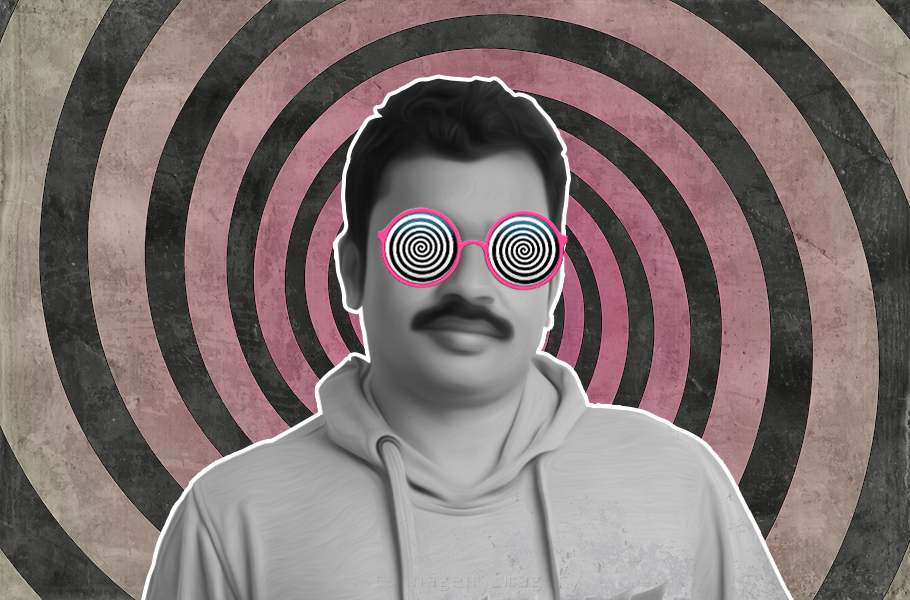
How Malayalees fell for a 'miracle' called Monson

Last week, Monson Mavunkal was arrested on charges of fake and fraudulent trade in antiques. He is a bearded man in his 40s, whose YouTube posts are popular. He kept top company and took care to be photographed with Mammootty, Mohanlal, political leaders like KPCC president, K Sudhakaran, and top police officers.
The ‘antiques’ he offered to sell included clothes Jesus wore, ancient editions of the Bible and the Quran, and a throne belonging to Tipu Sultan. He was doing pretty well for himself when the law caught up with him. He was once considered a successful entrepreneur; one who could speak well, as his YouTube lectures show, on the essence of peace in all religions, and on what a wonderful thing is Man—why don’t you buy this Waterman pen that Valmiki used?
Kerala never tires of patting itself on the back for its ‘advanced’ state of affairs in politics, welfare, literacy, and prides itself for having an independent mind. They question what does not stand to reason, and make pungent jokes on the primitivism of other people in other states.
Yet, Monson, who did not even complete his schooling, but had gone around introducing himself as a ‘world-renowned cosmetic therapist trained in Singapore and bio-wave cosmetic related institute in Germany’ (as his Google profile says), overcame the cynicism of the Malayalees and made a good living on the hopes he sold. Despite the many reports now on his exploits and arrests, there is no indication of what his upbringing was, or when he decided to sell miracles for a living since the last decade, or what he was doing before that.
A confidence trickster is mostly born that way. He must instinctively know the impossible is nothing. In some other century, he would have been confused for Napoleon, another man whose life was founded on the impossibility of things and who had said the word impossible was just not in his dictionary.
Also read: King of antics: The life and lies of Kerala con artist Monson
Jesus’ clothes. Tipu’s throne. Prophet Muhammad’s hair. Alexander’s nail. Anything. Anything at all could be sold. But why would intelligent people buy such memorabilia? We tend to believe that miracles (the impossibility of things, the great odds against predictable eventualities) do happen. Without that belief, there is no god, no heaven, not even hell. The last is crucial for all institutions of faith. Without hell, there is no heaven.
When we say miracles do happen, for the most part, we believe they will happen in the future. But they have already happened in the past, of course. Or, so we think. It is because they have a history—of having occurred before—that we believe they can happen again. But you need faith to will it to happen. Water has turned to wine once. It could again. Entropy is nothing, too.
Monson gave people hope. He is an evangelist in that sense. That so many chit funds and usurious finance companies flourish and fail and flourish again in Kerala is another indication that Malayalees love a miracle if it is dressed well. Monson was.
In the discussions and the general Clubhouse logorrhoea after Monson’s publicised arrest, the bearded Malayalee naturally questioned himself: how did we let Monson fool us? Well, because all of us believe in the impossibility of things. Kerala, for instance, has a very active and rich evangelical church industry. Its temples and mosques are among the richest in the country.
The more ‘progressive’ among them believe they are working toward—if not already inhabiting—a communist Utopia, when in fact there are, relatively speaking, neither a sufficient number of proletarians (there are no factories to speak of), nor for that matter a necessary quorum of brain-washable peasants, a condition for revolution. Yet, each generation believes that a political revolution has already happened on their watch when all that has really befallen them is a paradigm shift in culture.
The idea of a communist revolution itself is an artefact, a miraculous heirloom from another millennium and another continent, sold against reason by the Monsons of progressive political persuasions, decade after decade.
Also read: Kashmir: The sting in the mountains
Malayalees, in general, are of course shocked at the Monson phenomenon. It would be even more shocking if he failed. We are all wired to believe in the impossible. Indeed, we could not go on with our daily lives—consider the violence and disappointments we inflict almost helplessly on each other in our daily transactions—without the impossible guiding us like a beacon of light from far.
Monson’s throne and sword, shroud, and loincloth are symbols of hope. Their curio value is representative of the contradictory oddness at the heart of the human stain: hope in despair.
Monson did not have to go out of his way to sell his stuff. We had been already sold. He just put a price on it, and found the highest bidder. And he peddled it around in a (second-hand) Bentley—another symbol of the modern miracle.
In one of his Google profiles, Monson says he is a member of the World Peace Council—surely another evangelical institution: “The World Peace Council with its members from around the world work together to create a world with happiness, love and understanding. …Dr Monson Mavunkal is one of the few Indians holding membership in the prestigious World Peace Council.” And in a way, Monson was just doing his job, spreading happiness and peace in a world so desperate for both.
(CP Surendran’s novel, One Love And The Many Lives of Osip B is now available in book stores across India and Amazon)

